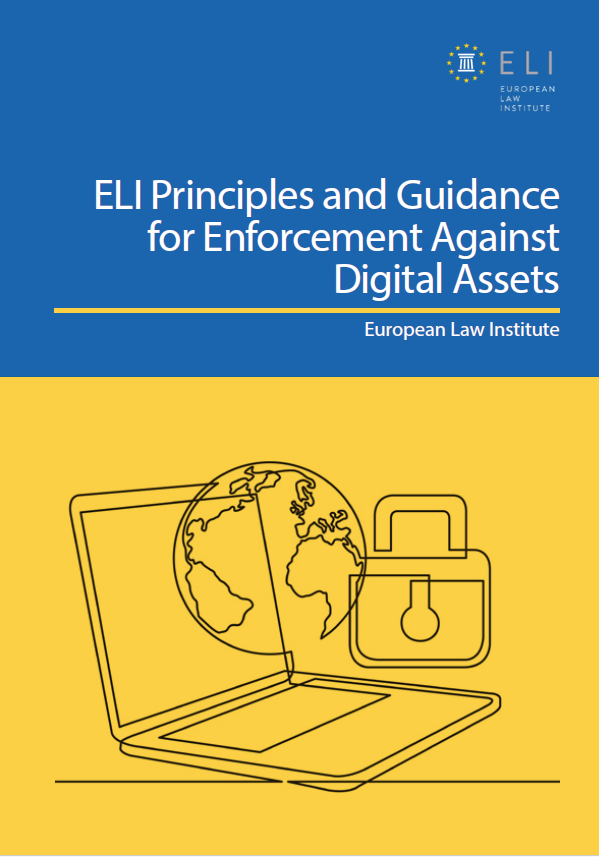ELI Principles and Guidance for Enforcement Against Digital Assets
Quick Facts
Project Type: Principles (in different instalments)
Procedure: Regular
Adopted: CD 2019/4 on Projects (Approval of a New Project on Access to Digital Assets)
Project Period: March 2019–March 2025
Events
An overview of past and upcoming events of this project is available here.
Background
This project follows on from the 'Fiduciary Access to Digital Assets Feasibility Study', which analysed whether the model law in this area, drafted by the US Uniform Law Commission (and taken over by the Uniform Law Conference of Canada), could be used as a starting point for a model law in the EU. The US model law gives 'fiduciaries' (such as personal representatives of decedents' estates) the legal authority to manage, to the extent possible, digital assets and electronic communications in the same way they manage tangible assets and financial accounts. It also gives custodians of digital assets and electronic communications legal authority to deal with the fiduciaries of their users. After some discussion, a conclusion was drawn that this rapidly developing area, by its nature cross-border, would not be served well by a model law. Some EU Member States might alter the model law and some Member States might not even enact it, thus making cross-border problems even more problematic instead of less.
Aim
The project aims to clarify and facilitate the position of those claiming an entitlement to digital assets and all those who increasingly have to deal with digital assets in their daily legal practice, in particular, judges, lawyers, notaries public, public registrars and enforcement agents. The aim of the project is to help bring coherence to, and promote the harmonisation of, existing laws and legal concepts relevant for access to digital assets.
Outcome
Originally, the project’s goal extended to identifying the various categories of digital assets, the types of persons who may wish or need to have access to them, and the settings in which questions of access could arise, followed by a more category-specific approach with a focus on digital assets as security for credit and enforcement against digital assets.
As the work of the Project Team matured, it became apparent that, in the case of a financial institution requiring access to, for instance, crypto-assets where these are offered as security for a loan, a different approach was needed compared to the situation of a judicial enforcement officer wishing to enforce a judgment. As work on the project progressed, developments accelerated, resulting in the decision to present the project’s output in two installments.
The first phase, the ELI Principles on the Use of Digital Assets, which focus on instances where private parties, whether natural or legal, contractually agree to create a security interest in a digital asset, were approved by the ELI Membership in February 2022 and are available for download here.
The second phase of the project, ELI Principles and Guidance for Enforcement Against Digital Assets, is now complete and soon to be published. This instrument offers a comprehensive framework to support courts, lawmakers, enforcement agents, regulators, and international bodies in addressing the challenges of enforcing rights against digital assets. It provides both high-level principles and practical guidance to assist in adapting legal procedures, improving enforcement mechanisms, and clarifying the property status and legal treatment of digital assets within national and cross-border contexts.
Case Studies
For some illustrative examples that the Access to Digital Assets project seeks to tackle, please click here.
Project Reporters
- Teresa Rodríguez de las Heras Ballell (as of September 2022)
- Jos Uitdehaag
Project Team Members
- Phoebus Athanassiou
- Wian Erlank
- Sabine Heijning
- Teemu Juutilainen
- Paul Matthews
- Thomas Meyer
- Christopher Mondschein
- Gabriele Della Morte
- Chris Odinet
- Denis Philippe
- Radim Polčák
- Albert Ruda
- Cayetana Santaolalla Montoya (as of November 2023)
- Teresa Touriñán
Advisory Committee Members
- Suzanne Brown Walsh
- Sergio Cámara Lapuente
- José Antonio Castillo Parrilla
- Sjef van Erp (Project Co-Reporter until September 2022)
- Richard Frimston
- José Llopis Benlloch
- Matthias Lehmann (Assessor)
- Peter Lown
- Donna Molzan
- Reiner Schulze (Assessor)
- Christiane Wendehorst (Assessor; until September 2021)
- Aneta Wiewiórowska-Domagalska (Assessor)
Members Consultative Committee
- Matthias Lehmann (MCC Chair)
- Jason Allen
- Marina Androulaki
- Cristina Argelich-Comelles
- Austrian Chamber of Civil Law Notaries (represented by Stephan Matyk-d'Anjony)
- Alessio Azzutti
- Arvind Babajee
- Curia of Hungary (represented by Mónika Gáspár; until June 2021)
- Iryna Dikovska
- David Dolidze
- Mustafa Ebaid
- European Law Students' Association Austria (represented by Anh Nguyen)
- European Union of Judges in Commercial Matters (represented by Rainer Sedelmayer)
- Laura Maria Franciosi
- Habbine Estelle Kim
- Karen Lynch Shally
- Lineke Minkjan
- Dimitrios Moustakatos
- Marlena Pecyna
- Meliha Povlakić
- Paola Rodas Paredes
- Domenico Rosani
- Cécile Sainte-Cluque
- Vyara Savova
- School of Law, University of Hull (represented by Gonzalo Vilalta Puig)
- Society of Trust and Estate Practitioners (represented by Leigh Sagar)
- Alina Sarchisian
- Ludovica Sposini
- Ferenc Szilágyi
- Antonio-Catalin Teodorescu
- Aura Esther Vilalta Nicuesa
- University of Latvia (represented by Vadims Mantrov)
-
Western University 'Vasile Goldis' Arad - Romania, Faculty of Law (represented by Christian Alunaru)
- Filippo Zatti
- Irina Zlatescu
- Muhammed Emirhan Havan
- Sara Adami-Johnson
- Rosa Giovanna Barresi
- Gabriela Varia
- Jørgen Bek Weiss Hansen
- Alisdair MacPherson
Observers
- European Commission (represented by Maria Vilar Badia and Veronica Williams)
- Spanish Land Registrars (represented by Silvino Navarro)

